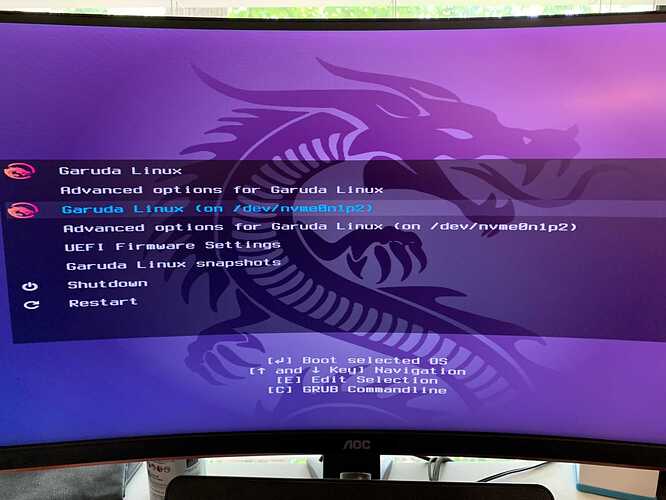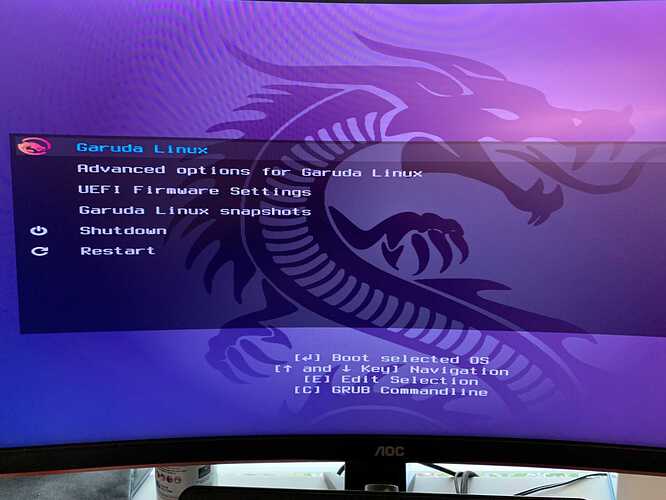Hi all. I recently came back from a week's vacation during which my computer was powered down. Since then, I have been unable to boot after updating. Every time I try, I get an error that one of my NVME drives can't be found by UUID (how I have it identified in my /etc/fstab), and the system drops me into an emergency shell.
I then reboot, restore my pre-update snapshot (with fallback initramfs), and I can boot into the system fine.
I've tried this three times, and each time I run into the same issue. Any help is greatly appreciated.
Here is my system info:
garuda-inxi
System:
Kernel: 5.17.9-zen1-1-zen arch: x86_64 bits: 64 compiler: gcc v: 12.1.0
parameters: BOOT_IMAGE=/@/boot/vmlinuz-linux-zen
root=UUID=948dd271-131a-4b40-8086-7b390c7c9723 rw rootflags=subvol=@
quiet splash rd.udev.log_priority=3 vt.global_cursor_default=0 loglevel=3
lsm=landlock,lockdown,yama,apparmor,bpf
Desktop: KDE Plasma v: 5.24.5 tk: Qt v: 5.15.4 info: latte-dock
wm: kwin_x11 vt: 1 dm: SDDM Distro: Garuda Linux base: Arch Linux
Machine:
Type: Desktop System: ASUS product: N/A v: N/A serial: <superuser required>
Mobo: ASUSTeK model: TUF GAMING X570-PRO (WI-FI) v: Rev X.0x
serial: <superuser required> UEFI: American Megatrends v: 4021
date: 08/10/2021
CPU:
Info: model: AMD Ryzen 5 5600X bits: 64 type: MT MCP arch: Zen 3
family: 0x19 (25) model-id: 0x21 (33) stepping: 0 microcode: 0xA201016
Topology: cpus: 1x cores: 6 tpc: 2 threads: 12 smt: enabled cache:
L1: 384 KiB desc: d-6x32 KiB; i-6x32 KiB L2: 3 MiB desc: 6x512 KiB
L3: 32 MiB desc: 1x32 MiB
Speed (MHz): avg: 4196 high: 4200 min/max: 2200/5279 boost: enabled
scaling: driver: acpi-cpufreq governor: performance cores: 1: 4195 2: 4198
3: 4197 4: 4200 5: 4199 6: 4196 7: 4197 8: 4200 9: 4189 10: 4191 11: 4199
12: 4197 bogomips: 100799
Flags: avx avx2 ht lm nx pae sse sse2 sse3 sse4_1 sse4_2 sse4a ssse3 svm
Vulnerabilities:
Type: itlb_multihit status: Not affected
Type: l1tf status: Not affected
Type: mds status: Not affected
Type: meltdown status: Not affected
Type: spec_store_bypass
mitigation: Speculative Store Bypass disabled via prctl
Type: spectre_v1
mitigation: usercopy/swapgs barriers and __user pointer sanitization
Type: spectre_v2 mitigation: Retpolines, IBPB: conditional, IBRS_FW,
STIBP: always-on, RSB filling
Type: srbds status: Not affected
Type: tsx_async_abort status: Not affected
Graphics:
Device-1: NVIDIA GA104 [GeForce RTX 3060] vendor: Micro-Star MSI
driver: nvidia v: 515.43.04 alternate: nouveau,nvidia_drm non-free: 515.xx+
status: current (as of 2022-05) arch: Ampere pcie: gen: 2 speed: 5 GT/s
lanes: 16 link-max: gen: 4 speed: 16 GT/s bus-ID: 0a:00.0
chip-ID: 10de:2487 class-ID: 0300
Device-2: Logitech HD Pro Webcam C920 type: USB
driver: snd-usb-audio,uvcvideo bus-ID: 5-2:3 chip-ID: 046d:082d
class-ID: 0102 serial: <filter>
Display: x11 server: X.Org v: 21.1.3 with: Xwayland v: 22.1.2
compositor: kwin_x11 driver: X: loaded: nvidia gpu: nvidia display-ID: :0
screens: 1
Screen-1: 0 s-res: 3440x1440 s-dpi: 109 s-size: 802x333mm (31.57x13.11")
s-diag: 868mm (34.19")
Monitor-1: DP-2 res: 3440x1440 hz: 60 dpi: 110
size: 797x334mm (31.38x13.15") diag: 864mm (34.02") modes: N/A
OpenGL: renderer: NVIDIA GeForce RTX 3060/PCIe/SSE2
v: 4.6.0 NVIDIA 515.43.04 direct render: Yes
Audio:
Device-1: NVIDIA GA104 High Definition Audio vendor: Micro-Star MSI
driver: snd_hda_intel v: kernel pcie: gen: 4 speed: 16 GT/s lanes: 16
bus-ID: 0a:00.1 chip-ID: 10de:228b class-ID: 0403
Device-2: AMD Starship/Matisse HD Audio vendor: ASUSTeK
driver: snd_hda_intel v: kernel pcie: gen: 4 speed: 16 GT/s lanes: 16
bus-ID: 0c:00.4 chip-ID: 1022:1487 class-ID: 0403
Device-3: Logitech HD Pro Webcam C920 type: USB
driver: snd-usb-audio,uvcvideo bus-ID: 5-2:3 chip-ID: 046d:082d
class-ID: 0102 serial: <filter>
Sound Server-1: ALSA v: k5.17.9-zen1-1-zen running: yes
Sound Server-2: PulseAudio v: 15.0 running: no
Sound Server-3: PipeWire v: 0.3.51 running: yes
Network:
Device-1: Intel Wi-Fi 6 AX200 driver: iwlwifi v: kernel pcie: gen: 2
speed: 5 GT/s lanes: 1 bus-ID: 05:00.0 chip-ID: 8086:2723 class-ID: 0280
IF: wlp5s0 state: down mac: <filter>
Device-2: Intel Ethernet I225-V vendor: ASUSTeK driver: igc v: kernel
pcie: gen: 2 speed: 5 GT/s lanes: 1 port: N/A bus-ID: 06:00.0
chip-ID: 8086:15f3 class-ID: 0200
IF: enp6s0 state: up speed: 1000 Mbps duplex: full mac: <filter>
Bluetooth:
Device-1: Intel AX200 Bluetooth type: USB driver: btusb v: 0.8
bus-ID: 1-4:5 chip-ID: 8087:0029 class-ID: e001
Report: bt-adapter ID: hci0 rfk-id: 0 state: up address: <filter>
Drives:
Local Storage: total: 3.71 TiB used: 1.3 TiB (34.9%)
SMART Message: Unable to run smartctl. Root privileges required.
ID-1: /dev/nvme0n1 maj-min: 259:0 model: T-FORCE TM8FP8001T
size: 953.87 GiB block-size: physical: 512 B logical: 512 B
speed: 31.6 Gb/s lanes: 4 type: SSD serial: <filter> rev: V9002s77
temp: 39.9 C scheme: GPT
ID-2: /dev/nvme1n1 maj-min: 259:1 model: T-FORCE TM8FP8001T
size: 953.87 GiB block-size: physical: 512 B logical: 512 B
speed: 31.6 Gb/s lanes: 4 type: SSD serial: <filter> rev: V9002s77
temp: 39.9 C scheme: GPT
ID-3: /dev/sda maj-min: 8:0 vendor: Samsung model: SSD 870 QVO 2TB
size: 1.82 TiB block-size: physical: 512 B logical: 512 B speed: 6.0 Gb/s
type: SSD serial: <filter> rev: 2B6Q scheme: GPT
ID-4: /dev/sdb maj-min: 8:16 type: USB vendor: SanDisk model: Cruzer
size: 14.61 GiB block-size: physical: 512 B logical: 512 B type: N/A
serial: <filter> rev: 1.00 scheme: MBR
SMART Message: Unknown USB bridge. Flash drive/Unsupported enclosure?
ID-5: /dev/sdc maj-min: 8:32 type: USB model: MXT-USB Storage Device
size: 14.75 GiB block-size: physical: 512 B logical: 512 B type: N/A
serial: <filter> rev: 1501 scheme: MBR
SMART Message: Unknown USB bridge. Flash drive/Unsupported enclosure?
Partition:
ID-1: / raw-size: 953.57 GiB size: 953.57 GiB (100.00%)
used: 264.76 GiB (27.8%) fs: btrfs dev: /dev/nvme0n1p2 maj-min: 259:3
ID-2: /boot/efi raw-size: 300 MiB size: 299.4 MiB (99.80%)
used: 576 KiB (0.2%) fs: vfat dev: /dev/nvme0n1p1 maj-min: 259:2
ID-3: /home raw-size: 953.57 GiB size: 953.57 GiB (100.00%)
used: 264.76 GiB (27.8%) fs: btrfs dev: /dev/nvme0n1p2 maj-min: 259:3
ID-4: /var/log raw-size: 953.57 GiB size: 953.57 GiB (100.00%)
used: 264.76 GiB (27.8%) fs: btrfs dev: /dev/nvme0n1p2 maj-min: 259:3
ID-5: /var/tmp raw-size: 953.57 GiB size: 953.57 GiB (100.00%)
used: 264.76 GiB (27.8%) fs: btrfs dev: /dev/nvme0n1p2 maj-min: 259:3
Swap:
Kernel: swappiness: 133 (default 60) cache-pressure: 100 (default)
ID-1: swap-1 type: zram size: 31.32 GiB used: 2.2 MiB (0.0%)
priority: 100 dev: /dev/zram0
Sensors:
System Temperatures: cpu: N/A mobo: N/A gpu: nvidia temp: 38 C
Fan Speeds (RPM): N/A gpu: nvidia fan: 0%
Info:
Processes: 377 Uptime: 2h 25m wakeups: 0 Memory: 31.32 GiB
used: 6.85 GiB (21.9%) Init: systemd v: 251 tool: systemctl Compilers:
gcc: 12.1.0 clang: 13.0.1 Packages: pacman: 2228 lib: 559 Shell: fish
v: 3.4.1 default: Bash v: 5.1.16 running-in: konsole inxi: 3.3.16
Garuda (2.6.3-2):
System install date: 2022-01-09
Last full system update: 2022-05-23
Is partially upgraded: Yes
Relevant software: NetworkManager
Windows dual boot: No/Undetected
Snapshots: Snapper
Failed units:

